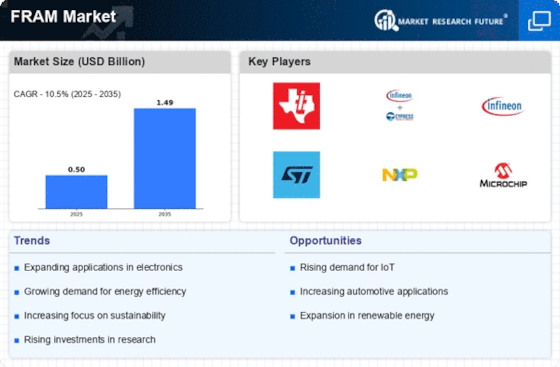Top Industry Leaders in the FRAM Market

The Competitive Landscape of the FRAM Market
The Ferroelectric Random-Access Memory (FRAM) market, powering industrial and IoT applications with non-volatile data retention, thrives on a dynamic tapestry of established players and innovative newcomers. Offering advantages like endurance, speed, and wide-temperature operation, FRAMs attract diverse industries, from automotive and aerospace to medical and industrial automation.
Some of the FRAM companies listed below:
- Texas Instruments
- Fujitsu Ltd
- Rohm Co., Ltd
- Cypress Semiconductor Corp
Strategies Adopted by Leaders
- Portfolio Diversification: Offering a comprehensive range of FRAM solutions across densities, memory architectures, and performance levels caters to diverse application needs and preferences.
- Technological Innovation and Feature Integration: Continuous R&D focuses on higher densities, faster read/write speeds, wider operating temperature ranges, and integration with security features like encryption and authentication.
- Focus on Specific Applications and Verticals: Targeting segments like automotive electronics, industrial automation, and aerospace with specialized FRAM solutions builds expertise and attracts key customers.
- Strategic Partnerships and Collaborations: Partnering with system integrators, chipmakers, and technology providers fosters innovation, expands distribution channels, and opens doors to new markets.
- Focus on Quality and Reliability: Ensuring stringent manufacturing processes, high-quality materials, and robust testing procedures builds trust and opens doors to critical applications demanding precision and reliability.
Factors for Market Share Analysis:
- Performance and Endurance: Delivering FRAMs with high read/write speeds, wider operating temperature ranges, and superior data retention (millions of write cycles) attracts customers in demanding environments.
- Density and Capacity: Offering high-density FRAM solutions (up to several megabits) accommodates increasing data storage needs in complex applications.
- Cost-Effectiveness and Price Point: Striking a balance between performance, features, and competitive pricing is crucial for attracting budget-conscious customers and expanding market penetration.
- Security and Reliability: Providing FRAMs with robust security features, error correction mechanisms, and resistance to radiation and electromagnetic interference caters to applications requiring data integrity.
- Ecosystem Compatibility and Standardization: Offering FRAMs compatible with major industry standards and memory interfaces simplifies design and integration into existing systems.
New and Emerging Companies:
- Niche Market Focus: Targeting specific segments like ultra-low-power FRAMs for wearables, high-temperature FRAMs for oil and gas exploration, or radiation-resistant FRAMs for space applications opens up new market opportunities.
- Focus on Emerging Technologies: Integrating technologies like embedded security engines, on-chip data encryption, and AI-powered data management positions them at the forefront of future market trends.
- Direct-to-Customer Sales and Engagement: Utilizing online platforms and social media marketing enables them to bypass traditional distribution channels and reach customers directly, often with more flexible engagement models.
- Focus on Open-Source Development and Collaboration: Utilizing open-source design platforms and fostering collaboration with developers attracts talent and facilitates rapid innovation for specific applications.
Industry Developments:
Oct. 31, 2022- Infineon Technologies announced the commercial availability of the industry's highest-density serial ferroelectric non-volatile memories. The company shipped 8 and 16Mbit industrial FRAM memories aimed at data-logging in automotive and industrial systems that can help prevent data loss in harsh operating environments. These memory devices have a wide voltage operation from 1.71 V to 3.6 V with support for SPI and quad SPI (QSPI) low-pin count interface in a 24-ball FBGA package.
Jul.17, 2023- Infineon Technologies AG launched two automotive-qualified serial FRAMs. These two automotive-qualified serial FRAM devices come in 1Mb and 4Mb densities. The 1Mb devices are the industry's first automotive-qualified serial FRAMs available. Infineon's FRAM devices will meet the growing demand for specialized data-logging memory devices that instantly capture and reliably store critical data for decades.









